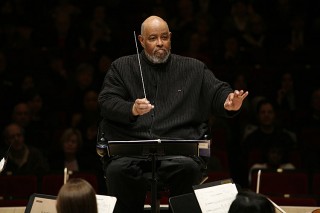Title

James DePreist conducting the Juilliard Orchestra in February 2008 at Carnegie Hall.
(Photo by Richard Termine)How does one measure a life upon passing? What is the formula for determining the value of existence? In this age of immediate, digital certainty, our popular culture gives us clear, perhaps misguided, factors—fame, wealth, power, achievement, conquest, glory. Saints and philosophers balance the equation with love, generosity, humility, service, integrity, wisdom. Poets and artists contribute their profound variables. Finally, each of us reckons the value of personal memories, good and bad, and tries to calculate the ineffable. We crave these sum totals, bottom lines, and evaluations—even when quantification is impossible. We want the comfort of a definitive answer. Eventually, we realize that, like pi, there is no final answer, only infinite reflection. And so it is, I am caught up in the bittersweet calculus of my own contemplation of James DePreist.
Body
Jimmy, as so many knew him, was my dear friend and mentor for many years. Much will be written regarding his artistic and personal achievements. Attention will be drawn to his heroic overcoming of racial barriers, polio, cancer, kidney disease, and other hurdles. The list of his awards, honors, and achievements is astounding. All of this is worth reviewing, and it is only for the constraints of space here that I do not include his long list of accomplishments. Articles abound already—Time magazine, The New York Times, The Washington Post, even the Peoria Journal Star. There is no doubt that he was a great man and artist.
Jimmy’s life and career are a study in perseverance, personal growth, and achievement. He found his own way successfully in so many areas of life through his character, intellect, and spirit. He leaves this inspiring legacy for artists and people everywhere: that obstacles, both from inside and out, can be met with strength, integrity, and grace. No one is the arbiter of your value except you. Others may pass judgment, but only you can pursue your destiny. This belief, and his sense of possibility, inspired numerous individuals.
Because of his deeply held values, he looked beyond the surface for the character and humanity in others. He fostered the careers of many fine musicians who would otherwise have been ignored (or were cast aside) by the arts industry. I know of many artists who were in life-ruining situations and survived and flourished through his kindness. Often he gave second and third chances to individuals he believed in—much to the consternation of those who would too quickly judge and condemn. In doing so, he helped numerous orchestral musicians, conductors, composers, young soloists, and administrators by giving them the early support they needed to succeed.
I imagine that everyone who knew him has his or her own Jimmy in mind. For many he was a bit of a conundrum. Winston Churchill once said that Russian policy is “a riddle wrapped in a mystery inside an enigma.” Similarly, Jimmy’s way was also inscrutable at times. He was at once a pragmatist and a poet, an artist and a businessman, an idealist and a realist. Perhaps a bit confounding for our calculations here, but then again, would any of us deny ourselves the freedom of our own inconsistencies?
In whatever capacity you encountered him, Jimmy was able to be simultaneously a friend, mentor, teacher, confidant, prankster, leader, artist, and philosopher. He knew how to play roles, but he never let any one role get in the way of his generous, encompassing humanity.
I hope you take some time, using your own formula, to contemplate this extraordinary man. Artists and great individuals often turn variables to constants and constants to variables. In doing so, they compel us to think beyond ourselves. Eventually, it all adds up. We balance our loss with the inestimable value of their presence in our lives. I will be pondering him for quite some time. It was an honor to work with Jimmy and call him a friend. Honestly, I cannot say goodbye to him, for he will always be my friend whose encouragement pushed me, wisdom informs me, and compassion continues to inspire me.




